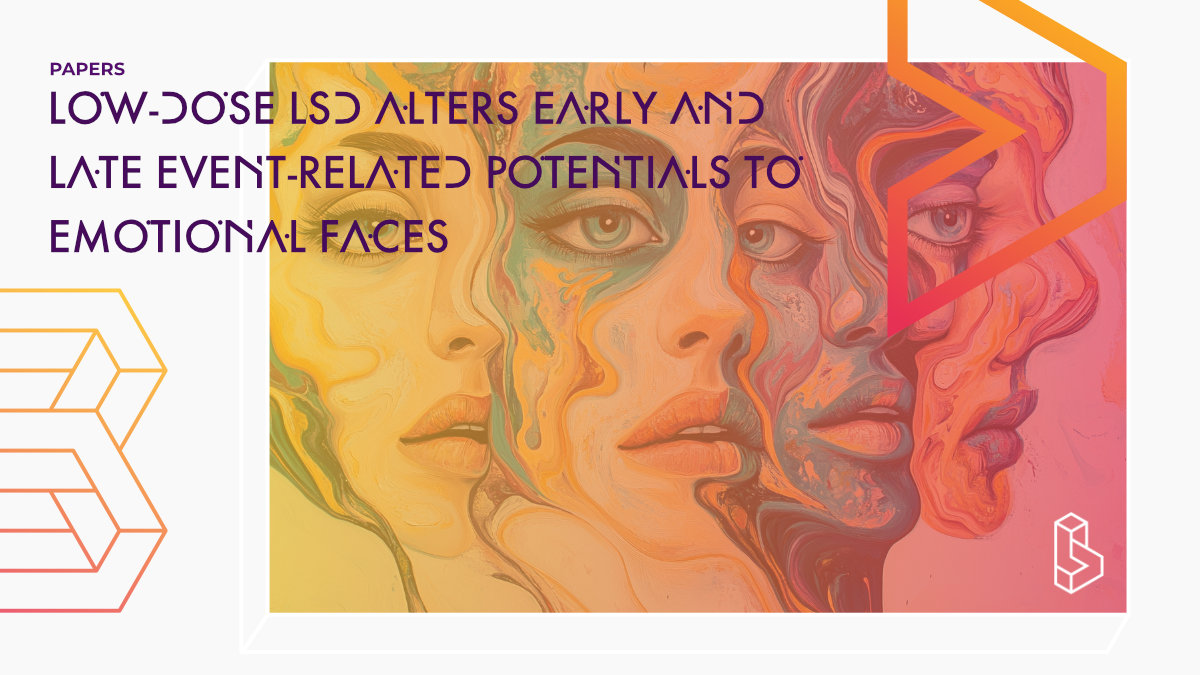This double-blind, randomized, placebo-controlled study (n=39) examines the effects of a single low dose of LSD (26µg) on event-related potentials during an emotional face oddball task. It finds that LSD significantly reduced the amplitude of N170 ERP to neutral faces and P300 ERP to neutral and happy faces, suggesting differential effects on brain responses to social and emotional information.
Abstract of Low-Dose LSD Alters Early and Late Event-Related Potentials to Emotional Faces
“Introduction: Despite widespread popular interest in the use of low doses of Lysergic acid diethylamide (LSD) to improve mood, little is known about how these doses affect emotional processing in the brain. In this study, we tested the effect of a single low dose of LSD (26 µg) compared with placebo on electroencephalogram (EEG) event-related potentials (ERP: N170, P300 and Mismatch Negativity) in healthy adults, while participants viewed angry, happy, and neutral faces. We hypothesized that the drug might affect either neutral faces, which are sometimes perceived as threatening, or emotional faces.
Methods: Healthy young adults (n = 39) received LSD (26 µg or placebo sublingually) before completing an oddball task with emotional facial expressions during EEG recording. The N170 and P300 evoked potentials were recorded using EEG. LSD and placebo were administered in double-blind, randomized order separated by at least 7 days. During the oddball task, three emotional faces were presented infrequently (angry, happy, neutral) in a block design, and a cartoon face was presented frequently.
Results: LSD significantly reduced the amplitude of the occipitotemporal N170 ERP to Neutral faces, but not angry or happy faces. LSD also reduced the amplitude of the midline posterior parietal P300 ERP to neutral and happy faces, but not angry faces.
Discussion: These differential effects of LSD on the amplitude of the N170 and P300 to neutral and emotional faces add to our understanding of how low doses of LSD might affect the brain response to social and emotional information.”
Authors: Connor J. Haggarty, Hanna M. Molla, James Glazer, Ilaria Tare, Alex Rains, Harriet de Wit & Royce Lee
Summary of Low-Dose LSD Alters Early and Late Event-Related Potentials to Emotional Faces
Haggarty and colleagues begin by discussing the renewed interest in LSD and other psychedelic drugs for their therapeutic potential. They note that while most recent studies have used full, hallucinogenic doses of these drugs, there has also been growing interest in the use of doses well below the threshold for typical psychedelic and somatic effects. The authors explain that survey studies and anecdotal reports suggest that low doses of LSD, about 10% of the psychedelic dose (5-20μg), taken every 3-4 days, may improve mood, cognition, and increase feelings of well-being. However, they point out that these beneficial effects have been difficult to demonstrate in controlled studies.
The researchers highlight that even in the absence of obvious psychedelic effects, low doses of LSD may affect brain function. They cite previous studies showing that low doses of LSD can alter brain connectivity between prefrontal and limbic circuits and enhance the reactivity of reward-related brain circuits. Haggarty and colleagues explain that these effects could be mediated by several mechanisms, including serotonin receptor-mediated activity of neural networks, neuroplastic processes such as brain-derived neurotrophic factor release, or increased neuroplasticity.
Find this paper
Low-Dose LSD Alters Early and Late Event-Related Potentials to Emotional Faces
https://doi.org/10.1089/psymed.2024.0005
Paywall | Google Scholar | Backup | 🕊
Cite this paper (APA)
Haggarty, C., Molla, H., Glazer, J., Tare, I., Rains, A., de Wit, H., & Lee, R. (2024). Low-Dose LSD Alters Early and Late Event-Related Potentials to Emotional Faces. Psychedelic Medicine.
Study details
Topics studied
Microdosing
Healthy Subjects
Study characteristics
Original
Placebo-Controlled
Double-Blind
Within-Subject
Randomized
Participants
39
Humans
Compound Details
The psychedelics given at which dose and how many times
LSD 26 μg | 1x
